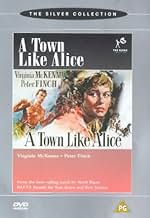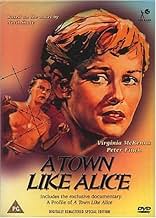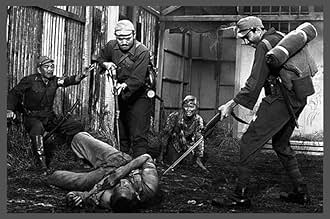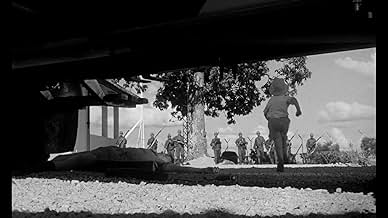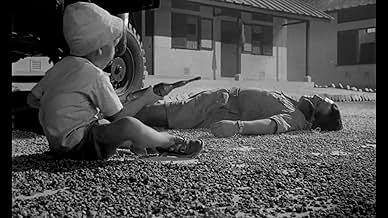IMDb RATING
7.2/10
2.1K
YOUR RATING
A newly wealthy English woman returns to Malaya to build a well for the villagers who helped her during war. Thinking back, she recalls the Australian man who made a great sacrifice to aid h... Read allA newly wealthy English woman returns to Malaya to build a well for the villagers who helped her during war. Thinking back, she recalls the Australian man who made a great sacrifice to aid her and her fellow prisoners of war.A newly wealthy English woman returns to Malaya to build a well for the villagers who helped her during war. Thinking back, she recalls the Australian man who made a great sacrifice to aid her and her fellow prisoners of war.
- Director
- Writers
- Stars
- Won 2 BAFTA Awards
- 2 wins & 5 nominations total
Kenji Takaki
- Japanese Sergeant
- (as Takagi)
Munesato Yamada
- Captain Takata
- (as Yamada)
Otokichi Ikeda
- Kempetei Sergeant
- (as Ikeda)
- Director
- Writers
- All cast & crew
- Production, box office & more at IMDbPro
Featured reviews
I suppose that it should be confessed at the outset that I had the hots for Ms McEnna in her youth. Nevertheless, I still think that this is an excellent movie of the 1950's war genre.
Ginny and Peter Finch provide typically understated performances that are reminiscent of 'Ice Cold In Alex' and 'The Cruel Sea'. Solid, sterling, stiff-upper-lip-stuff that has no place in the spineless, simpering, metro-sexual third millennium.
I have never read Shute's novel, so I cannot comment on what liberties have been taken, but viewed without prejudice as a movie outlining Japanese brutality and human endurance it is still a well-realised piece of work. Everyone gives a thoroughly believable turn, both Caucasian and Oriental alike, as Ms McEnna's character concludes 'you can't really hate anyone' in the end. Though the Japanese - like their Nazi counterparts - did their very best to merit it.
Ms McKenna leads a group of unwanted western women and children, for whom no Japanese officer wants responsibility. So; they get shunted from one place to another, on foot, inadequately fed, and without medical assistance. Inevitably; they begin dying. Finch plays a captured Aussie running trucks for the Japanese. Filmed in black-&-white, in Britain and on location, it offers a very believable turn upon the miasmic swamps, crippling heat, humidity and deluging rain.
Of course, it's a love story too. And here again Ginny and Peter play their parts to perfection. I defy any true romantic not to be rendered lachrymose by her realisation of his survival and their final meeting at the end. Her hasty, last-minute application of cosmetics is particularly touching and well-observed. As if he'd care a hoot one way or the other.
It's a great old feel-good movie for the austerity generation. I give it nine stars and good luck to 'em all I say.
Ginny and Peter Finch provide typically understated performances that are reminiscent of 'Ice Cold In Alex' and 'The Cruel Sea'. Solid, sterling, stiff-upper-lip-stuff that has no place in the spineless, simpering, metro-sexual third millennium.
I have never read Shute's novel, so I cannot comment on what liberties have been taken, but viewed without prejudice as a movie outlining Japanese brutality and human endurance it is still a well-realised piece of work. Everyone gives a thoroughly believable turn, both Caucasian and Oriental alike, as Ms McEnna's character concludes 'you can't really hate anyone' in the end. Though the Japanese - like their Nazi counterparts - did their very best to merit it.
Ms McKenna leads a group of unwanted western women and children, for whom no Japanese officer wants responsibility. So; they get shunted from one place to another, on foot, inadequately fed, and without medical assistance. Inevitably; they begin dying. Finch plays a captured Aussie running trucks for the Japanese. Filmed in black-&-white, in Britain and on location, it offers a very believable turn upon the miasmic swamps, crippling heat, humidity and deluging rain.
Of course, it's a love story too. And here again Ginny and Peter play their parts to perfection. I defy any true romantic not to be rendered lachrymose by her realisation of his survival and their final meeting at the end. Her hasty, last-minute application of cosmetics is particularly touching and well-observed. As if he'd care a hoot one way or the other.
It's a great old feel-good movie for the austerity generation. I give it nine stars and good luck to 'em all I say.
This film is in the same league as the series Tenko for it's realism. I have also watched the mini series which could have it's moments too but the film wins because of the fact that it was made around a decade after it had happened, when things must have been quite fresh in everyones minds. These women were taken captive as the men were but they were not wanted by anyone. These women were far away from home with no clothes apart from what they stood up in, no money and they didn't speak the language. Given those fact the thoughts are so scary!
The Rank Organisation went whole hog in producing A Town Like Alice with location shooting in Malaya, Australia, and the United Kingdom. The results were well worth the effort and the film was a big boost to the careers of Peter Finch and Virginia McKenna. In fact as Finch was becoming more and more an international star he would get fewer roles like this one, playing a native Australian.
I was expecting when deciding to view this film that it would be similar in nature to the American film Three Came Home that starred Claudette Colbert as a woman prisoner of the Japanese in World War II. The woman prisoners were segregated, but quickly housed and fended for themselves as best they could, but in a static setting.
When the male prisoners are separated from the females after the fall of Malaya, these woman are put under guard and just sent around like vagabonds with their children if they had them. Why they were selected for this rather special brand of torture we can speculate on end, but whatever the Japanese idea of chivalry was to the women, they couldn't just outright kill them. In fact none are during this film.
The film is seen through McKenna's eyes, she's working as a secretary in Kuala Lampur when the Japanese takeover. She takes over too as guardian of her boss's kids after their mother dies early on in the strange odyssey. Peter Finch plays an Australian soldier who with his mates they constantly run into and who offers them help when he can sneak food and medicine from the Japanese. He pays a heavy price for doing this when he's caught.
When he was killed by Irish Terrorists in 1979, it was learned that Lord Mountbatten had specifically requested that at his funeral no representation from the Japanese was to be permitted. As Supreme Commander of that theater Mountbatten remembered all the horror stories he heard from people survived Japanese internment, even the strange internment where apparently the whole country was their jail.
How McKenna and those that remained survived is quite a story, let's say it involved breaking a lot of cultural barriers to do it. One of the women who did it her own way was Maureen Swanson who after McKenna refuses his proposition, she takes up with a Japanese captain. Swanson is another you'll remember from A Town Like Alice.
Alice refers to Alice Springs in Northern Territory where Finch reminisces he'd like to return. It sounds like heaven, looks pretty good too after the years in Malaya. The film is a really good war film from the not often heard from point of view of woman prisoners.
I was expecting when deciding to view this film that it would be similar in nature to the American film Three Came Home that starred Claudette Colbert as a woman prisoner of the Japanese in World War II. The woman prisoners were segregated, but quickly housed and fended for themselves as best they could, but in a static setting.
When the male prisoners are separated from the females after the fall of Malaya, these woman are put under guard and just sent around like vagabonds with their children if they had them. Why they were selected for this rather special brand of torture we can speculate on end, but whatever the Japanese idea of chivalry was to the women, they couldn't just outright kill them. In fact none are during this film.
The film is seen through McKenna's eyes, she's working as a secretary in Kuala Lampur when the Japanese takeover. She takes over too as guardian of her boss's kids after their mother dies early on in the strange odyssey. Peter Finch plays an Australian soldier who with his mates they constantly run into and who offers them help when he can sneak food and medicine from the Japanese. He pays a heavy price for doing this when he's caught.
When he was killed by Irish Terrorists in 1979, it was learned that Lord Mountbatten had specifically requested that at his funeral no representation from the Japanese was to be permitted. As Supreme Commander of that theater Mountbatten remembered all the horror stories he heard from people survived Japanese internment, even the strange internment where apparently the whole country was their jail.
How McKenna and those that remained survived is quite a story, let's say it involved breaking a lot of cultural barriers to do it. One of the women who did it her own way was Maureen Swanson who after McKenna refuses his proposition, she takes up with a Japanese captain. Swanson is another you'll remember from A Town Like Alice.
Alice refers to Alice Springs in Northern Territory where Finch reminisces he'd like to return. It sounds like heaven, looks pretty good too after the years in Malaya. The film is a really good war film from the not often heard from point of view of woman prisoners.
Soon after the end of real hostilities in 1945, Hollywood produced the first of many subsequent films from the perspective of prisoners of war held by the Japanese: that film was Three Came Home (1950) with Claudette Colbert. I recall seeing that one a long time ago and recall the dark nature of that narrative (I have yet to submit a review here, but I will, in time).
A Town Like Alice is a different kettle of fish, so to speak: instead of a single family, it's a mix of various women and children caught up in the retreat to Singapore in 1941, and follows their seemingly unending trek across Malaya, from camp to camp, seeking admission and a final resting place to wait out the war.
The black and white photography is superb as the downtrodden party weaves its way through swamp, dirt roads, wet and dry season, very little food or water, malaria, dysentery and all other manner of tropical diseases. Little wonder that, as they walk, they also die, one at a time, from malnutrition and sickness, and all the while, their guard, an old-timer, gradually comes to admire their perseverance just as the women come to respect the old man's quiet determination to keep helping them to survive. That's the main story.
The big sub-plot is how Jean Paget (Virginia McKenna) meets Joe Harmon (Peter Finch), also a prisoner of war, and how they both come to fall in love on the run, if you know what I mean: they keep meeting (he is pressed into service as a driver for the Japanese) at different parts of Malaya as the women keep wandering around, looking for a place to stay. So, there is a bit of comedy from the irrepressible Aussie soldiers, mixed with moments of real tension as the two lovers try to keep a relationship going under such conditions. And, it's during one of those meetings that Jean learns that Joe comes from Alice Springs.
Never boring, and with stand-out scenes, such as one of the little boys running in between the advancing Japanese soldiers with his toy gun, shouting "bang, bang" (reminiscent of Brandon de Wilde in Shane [1953], doing the same thing, and annoying Jean Arthur, inside the farm house); the joy of the women when they come across an abandoned house with hot running water; and, Jean's bargaining with a Malay shop-keeper for tinned milk for a baby.
If this period in history is of interest, you could do worse to spend two hours of your time. And, as for how the romance turns out, well, you'll just have to see the movie, won't you?
A Town Like Alice is a different kettle of fish, so to speak: instead of a single family, it's a mix of various women and children caught up in the retreat to Singapore in 1941, and follows their seemingly unending trek across Malaya, from camp to camp, seeking admission and a final resting place to wait out the war.
The black and white photography is superb as the downtrodden party weaves its way through swamp, dirt roads, wet and dry season, very little food or water, malaria, dysentery and all other manner of tropical diseases. Little wonder that, as they walk, they also die, one at a time, from malnutrition and sickness, and all the while, their guard, an old-timer, gradually comes to admire their perseverance just as the women come to respect the old man's quiet determination to keep helping them to survive. That's the main story.
The big sub-plot is how Jean Paget (Virginia McKenna) meets Joe Harmon (Peter Finch), also a prisoner of war, and how they both come to fall in love on the run, if you know what I mean: they keep meeting (he is pressed into service as a driver for the Japanese) at different parts of Malaya as the women keep wandering around, looking for a place to stay. So, there is a bit of comedy from the irrepressible Aussie soldiers, mixed with moments of real tension as the two lovers try to keep a relationship going under such conditions. And, it's during one of those meetings that Jean learns that Joe comes from Alice Springs.
Never boring, and with stand-out scenes, such as one of the little boys running in between the advancing Japanese soldiers with his toy gun, shouting "bang, bang" (reminiscent of Brandon de Wilde in Shane [1953], doing the same thing, and annoying Jean Arthur, inside the farm house); the joy of the women when they come across an abandoned house with hot running water; and, Jean's bargaining with a Malay shop-keeper for tinned milk for a baby.
If this period in history is of interest, you could do worse to spend two hours of your time. And, as for how the romance turns out, well, you'll just have to see the movie, won't you?
This is a moving film with a stunning performance by Virginia McKenna. It also has Peter Finch in a portrayal of what must be the quintessential Australian character of the period.
The film is told in flashback as Virginia McKenna's character, Jean Paget, goes back to Malaya after WW2 to help the villagers who saved her life. We learn that Jean was captured there by the Japanese along with a group of other British women and children.
They are sent from town to town on foot. However, no Japanese will take responsibility for them - they walk hundreds of miles and many die. They encounter an Australian, Joe Harman, played by Peter Finch, who finds them food and medicine. Finally, the survivors see out the rest of the war in a Malay village. After the war, Jean travels back to Malaya and then to Australia to learn of Joe's fate.
I saw this film in a packed cinema in Sydney when it was first released in 1956. I was quite young, but there would no doubt have been many in the audience who had first-hand experience of war with the Japanese, including my father. The film resonated with Australians who did not feel great love for the Japanese at the time, mainly due to their treatment of prisoners of war.
Also at that time, Australians were rarely depicted on the screen, but Aussie, Joe Harman, has a key role, which accorded with the idealised national character of the day, unfortunately including his use of derogatory terms for native peoples, common at the time.
Although much of the film was shot in the studio, there was enough location shooting in Malaya and Australia to give it a feeling of authenticity.
It is a harrowing story with many heartbreaking scenes. It vividly captures the fall of empire as the Japanese supplant the British in Malaya, and humiliate them in front of their former colonial subjects. The scenes of the women and children trudging along holding their meagre possessions or the little girl looking back as she leaves a beloved rocking horse show their comfortable lifestyles torn asunder.
Jean Paget emerges as one of the strong characters of the group. This is such a truthful performance by Virginia McKenna who looks beautiful even though she is covered in sweat and dirt for much of the film.
The story is fictional. It is based on Neville Shute's novel, which he based on the plight of a group of Dutch women in similar circumstances in Sumatra. However, it is possible they didn't actually have to walk everywhere. In that case does the film slander the Japanese?
Fresh in people's minds when the film came out, was the knowledge that the Japanese had carried out a number of death marches in the Philippines and Borneo as well as atrocities on the Thailand-Burma Railroad. Japanese troops had also been involved in the massacre of prisoners of war, nurses and tens of thousands of Chinese civilians in Singapore and elsewhere.
The events in "A Town Like Alice" may be fictionalised but they fit the modus operandi. The militaristic Japanese regime of the time looked with contempt on people who surrendered in war, and this often manifested itself in cruel treatment.
Although the Australian-made mini-series with the charismatic Bryan Brown and luminous Helen Morse brought more of the book to the screen, I don't think it diminishes this version at all - it is still unforgettable.
The film is told in flashback as Virginia McKenna's character, Jean Paget, goes back to Malaya after WW2 to help the villagers who saved her life. We learn that Jean was captured there by the Japanese along with a group of other British women and children.
They are sent from town to town on foot. However, no Japanese will take responsibility for them - they walk hundreds of miles and many die. They encounter an Australian, Joe Harman, played by Peter Finch, who finds them food and medicine. Finally, the survivors see out the rest of the war in a Malay village. After the war, Jean travels back to Malaya and then to Australia to learn of Joe's fate.
I saw this film in a packed cinema in Sydney when it was first released in 1956. I was quite young, but there would no doubt have been many in the audience who had first-hand experience of war with the Japanese, including my father. The film resonated with Australians who did not feel great love for the Japanese at the time, mainly due to their treatment of prisoners of war.
Also at that time, Australians were rarely depicted on the screen, but Aussie, Joe Harman, has a key role, which accorded with the idealised national character of the day, unfortunately including his use of derogatory terms for native peoples, common at the time.
Although much of the film was shot in the studio, there was enough location shooting in Malaya and Australia to give it a feeling of authenticity.
It is a harrowing story with many heartbreaking scenes. It vividly captures the fall of empire as the Japanese supplant the British in Malaya, and humiliate them in front of their former colonial subjects. The scenes of the women and children trudging along holding their meagre possessions or the little girl looking back as she leaves a beloved rocking horse show their comfortable lifestyles torn asunder.
Jean Paget emerges as one of the strong characters of the group. This is such a truthful performance by Virginia McKenna who looks beautiful even though she is covered in sweat and dirt for much of the film.
The story is fictional. It is based on Neville Shute's novel, which he based on the plight of a group of Dutch women in similar circumstances in Sumatra. However, it is possible they didn't actually have to walk everywhere. In that case does the film slander the Japanese?
Fresh in people's minds when the film came out, was the knowledge that the Japanese had carried out a number of death marches in the Philippines and Borneo as well as atrocities on the Thailand-Burma Railroad. Japanese troops had also been involved in the massacre of prisoners of war, nurses and tens of thousands of Chinese civilians in Singapore and elsewhere.
The events in "A Town Like Alice" may be fictionalised but they fit the modus operandi. The militaristic Japanese regime of the time looked with contempt on people who surrendered in war, and this often manifested itself in cruel treatment.
Although the Australian-made mini-series with the charismatic Bryan Brown and luminous Helen Morse brought more of the book to the screen, I don't think it diminishes this version at all - it is still unforgettable.
Did you know
- TriviaAccording to the book 'The Golden Gong---Fifty years of the Rank Organisation, its films and its stars' by Quentin Falk, "While at premiere of a Disney film, 'Robin Hood' [See: Robin des Bois et ses joyeux compagnons (1952)], he [Earl St. John] was particularly impressed by the young man who played the Sheriff of Nottingham. The name on the programme was that of Peter Finch. St. John bumped into Finch on the stairs of the theatre and invited him to come and talk business at Pinewood. Next day he gave Finch what would be a pivotal role in his burgeoning career: the Australian soldier, Joe, in Ma vie commence en Malaisie (1956).
- GoofsHarry Corbett bought his Sooty puppet from a regular store---he didn't design or create it as such. It's possible therefore that Freddie might have had the same puppet before Harry Corbett gave it national fame.
- Quotes
[repeated line]
Japanese Sergeant: Japanese women walk!
- Crazy creditsOPENING CREDITS PROLOGUE: "The characters in this story are fictitious. The story itself however is based upon true fact."
- ConnectionsFeatured in A Profile of 'A Town Like Alice' (2001)
- How long is A Town Like Alice?Powered by Alexa
Details
- Release date
- Country of origin
- Languages
- Also known as
- The Rape of Malaya
- Filming locations
- Kuala Lumpur, Malaysia(establishing shot of British Government Offices - now the Sultan Abdul Samad Building)
- Production companies
- See more company credits at IMDbPro
- Runtime
- 1h 57m(117 min)
- Color
- Aspect ratio
- 1.66 : 1
Contribute to this page
Suggest an edit or add missing content


